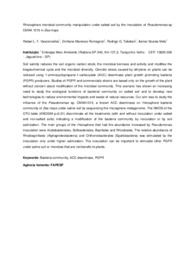Rhizosphere microbial community manipulation under salted soil by the inoculation of Pseudomonas sp CMAA 1215 in Zea mays.
Rhizosphere microbial community manipulation under salted soil by the inoculation of Pseudomonas sp CMAA 1215 in Zea mays.
Autoria: VASCONCELLOS, R. L. F.; ROMAGNOLI, E. M.; TAKETANI, R. G.; MELO, I. S. de
Resumo: Soil salinity reduces the soil organic carbon stock, the microbial biomass and activity and modifies the biogeochemical cycle and the microbial diversity. Osmotic stress caused by ethylene on plants can be reduced using 1-aminocyclopropane-1-carboxylate (ACC) deaminase plant growth promoting bacteria (PGPR) producers. Studies of PGPR and commercially strains are based only on the growth of the plant without concern about modification of the microbial community. This scenario has shown an increasing need to study the ecological functions of bacterial community on salted soil and to develop new technologies to reduce environmental impacts and waste of natural resources. Our aim was to study the influence of the Pseudomonas sp. CMAA1215, a known ACC deaminase on rhizosphere bacteria community of Zea mays under saline soil by sequencing the rhizosphere metagenome. The NMDS of the OTU table (ANOSIM p<0.01) discriminate all the treatments (with and without inoculation under salted and non-salted soils) indicating a modification of the bacteria community by inoculation or by soil salinization. The main groups of the rhizosphere that had the abundance increased by Pseudomonas inoculation were Acidobacteriales, Solibacteriales, Bacillales and Rhizobiales. The relative abundance of Rhodospirillales (Alphaproteobacteria) and Chthoniobacterales (Spartobacteria) was stimulated by the inoculation only under higher salinization. The inoculation can be important to stimulate other PGPR under saline soil or microbes that are not benefic to plants.
Ano de publicação: 2015
Tipo de publicação: Resumo em anais e proceedings
Unidade: Embrapa Meio Ambiente
Palavras-chave: ACC deaminase, Bacteria community, PGPR
Observações
1 - Por padrão são exibidas publicações dos últimos 20 anos. Para encontrar publicações mais antigas, configure o filtro ano de publicação, colocando o ano a partir do qual você deseja encontrar publicações. O filtro está na coluna da esquerda na busca acima.
2 - Para ler algumas publicações da Embrapa (apenas as que estão em formato ePub), é necessário ter, no celular ou computador, um desses softwares gratuitos. Sistemas Android: Google Play Livros; IOS: iBooks; Windows e Linux: software Calibre.
Acesse outras publicações
Acesse a Base de Dados da Pesquisa Agropecuária (BDPA) para consultar o acervo completo das bibliotecas da Embrapa.

